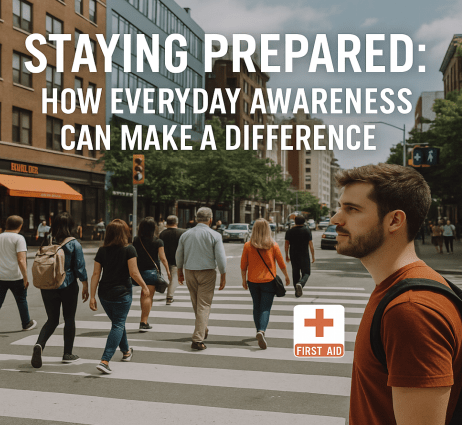How Everyday Awareness Can Make a Difference

In a fast-paced world where news is constantly changing, staying informed about global events is second nature. Yet, amidst the headlines and breaking stories, one crucial aspect often goes overlooked: being prepared for emergencies in our everyday lives.
From sudden medical incidents to accidents at home or work, preparedness is more than just a mindset—it’s a skill that can save lives. Developing these skills doesn’t just benefit you personally—it contributes to the well-being of your entire community.
Understanding the Importance of Emergency Preparedness
Emergency preparedness isn’t limited to having a fire extinguisher or knowing the nearest hospital. It encompasses understanding basic life-saving techniques, knowing how to respond calmly under pressure, and being ready to assist others when needed. For families, communities, and workplaces alike, being equipped with these skills can significantly reduce the severity of unexpected situations.
One of the simplest ways to be prepared is through education. Workshops and courses designed to teach practical skills are becoming increasingly essential.
They focus not only on immediate response but also on preventing emergencies from escalating. These programs emphasize awareness, quick thinking, and proactive measures, which can make a tangible difference when seconds count. Being proactive rather than reactive can save not only time and resources but lives.
Integrating Safety Awareness into Daily Life
Integrating safety awareness into daily routines can be straightforward. Start by familiarizing yourself with potential hazards at home, such as slippery floors, exposed electrical outlets, or kitchen equipment. At the workplace, encourage safety drills and make sure employees know where emergency exits and first aid supplies are located. These small steps foster a culture of vigilance and preparedness.
Moreover, teaching children and younger family members about basic safety protocols can build lifelong habits. Simple actions, like knowing when and how to call emergency services or understanding basic first aid concepts, empower them to act confidently during crises. It’s about instilling a sense of responsibility while ensuring that safety remains a shared priority in the household. Communities thrive when everyone is equipped with knowledge that can prevent accidents from becoming emergencies.
The Role of Professional Training
While awareness is crucial, professional training provides the confidence and competence needed to act effectively. Taking part in certified courses ensures that individuals are well-versed in proven techniques for handling emergencies. These programs cover vital topics such as first aid, CPR, and managing injuries—knowledge that transforms a passive observer into a capable responder.
For instance, individuals seeking to enhance their preparedness can benefit from a First aid and CPR course Milton. Such courses provide hands-on experience, simulating real-life scenarios to reinforce practical skills. Beyond personal safety, this training enables participants to support others during critical moments, whether at home, in the workplace, or within the community. Having these skills gives peace of mind in knowing you can make a difference when it matters most.
Cultivating a Culture of Safety in Communities
Communities that prioritize preparedness often see reduced risks and better outcomes during emergencies. Public awareness campaigns, local workshops, and accessible training programs contribute to a shared sense of responsibility. When citizens are informed and trained, neighborhoods become safer, and incidents that might have otherwise escalated can be managed effectively.
Employers, schools, and civic organizations can play a pivotal role in promoting safety. Encouraging participation in training programs, providing resources for emergency planning, and fostering open discussions about risk management creates an environment where preparedness is normalized rather than reactive. A well-prepared community is more resilient, and the ripple effects of training can extend far beyond a single household.
Conclusion: Small Steps, Big Impact
While we cannot predict every emergency, we can control how prepared we are to face them. Combining awareness, education, and professional training equips individuals with the tools needed to act decisively when it matters most. By prioritizing preparedness, whether through courses, drills, or daily vigilance, we take meaningful steps toward protecting ourselves and those around us.
Investing time in learning life-saving skills is not just a precaution—it’s a responsibility. A single decision to get trained can make all the difference in an unexpected situation, turning potential tragedy into a story of resilience and quick thinking. Knowledge, practice, and awareness together create a safer, more confident community ready to face the unexpected.




